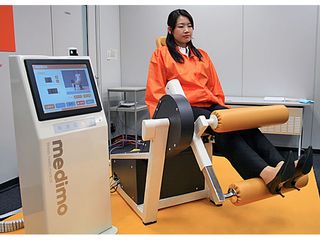Half of babies born in West will be centenarians
Leeds Uni launches new £50m bio-tech initiative

Over half of all babies born in rich nations today will live to be older than a hundred years old, with a group of leading British bio-tech scientists developing cutting-edge new techniques to ensure many more of us reach our century year.
The news comes from a recent report published in medical journal the Lancet, at the same time as the announcement of a new £50 million bio-technology initiative at the University of Leeds, with funding coming from a range of research councils, charities and industry.
Leeds Uni houses the UK's largest bioengineering unit and is the world leader in artificial human joints research. The new project has the objective of developing artificial hip and knee joints that will give people 50 active years beyond the age of 50.
In comparison, current hip and knee replacements tend to last, on average, around 20 years.
Oooh, me knee!
"None of us is getting any younger," Professor Eileen Ingham, deputy director of Leeds' Institute of Medical and Biological Engineering told the Guardian.
"These advanced therapies will be available to help people, but only if we can take these world-class ideas and turn them into tangible products.
Get daily insight, inspiration and deals in your inbox
Get the hottest deals available in your inbox plus news, reviews, opinion, analysis and more from the TechRadar team.
"The UK has had a historical inability to take innovations and translate them into best practices, but we do have some really good science."
The institute is also developing artificial heart valves that the body thinks are its own, as well as using similar techniques to create new skin and cartilage for burns victims.
Director of the Institute Professor John Fisher said: "By 2015 we absolutely believe we will be delivering improvements for patients, through the NHS or in commercial products that will be sold throughout the world," he said.
Via Guardian.co.uk
Most Popular

